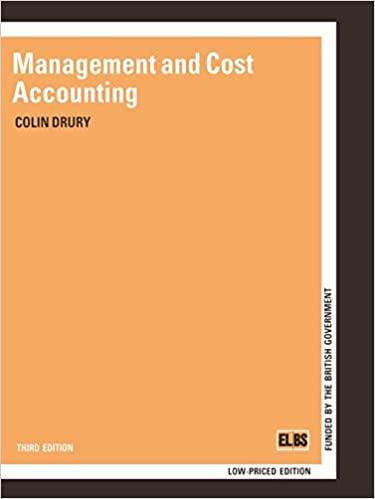Josun pic manufactures cereal based foods, mcluding various breakfast cereals under private brand labels. In March 1984
Question:
Josun pic manufactures cereal based foods, mcluding various breakfast cereals under private brand labels. In March 1984 the company had been approached by Cohin pic, a large national supermarket chain, to tender for the manufacture and supply of a crunchy style breakfast cereal made from oats, nuts, raisins, etc.
The tender required Josun to quote prices for a 1.5 kg packet at three different weekly volumes: 50 000, 60 000 and 70 000. Josun pic had, at present. excess capacity on some of its machines and could make a maximum of 80 000 packets of cereal a week.
Josun's management accountant is asked to prepare a costing for the Cohin tender. The company prepares its tender prices on the basis of full cost plus 15% of cost as a profit margin. The full cost 1s made up of five elements: raw materials per packet of 30p;
operating wages 12p per packet; manufacturing overheads costed at 200% of operating wages; administration and other corporate overheads at 100% of operating wages; and packaging and transport costing 1 Op per packet. The sales manager has suggested that as an incentive to Cohin, the profit margin be cut on the 60000 and 70000 tenders by 112% and 1% to 14V2% and 14%
respectively. The manufacturing and administration overheads are forecast as fixed at £12 500 per week, unless output drops to 50000 units or below per week, when a sav1ng of £1000 per week can be made. If no contract is undertaken then all the manufacturing and administration overheads will be saved except for £600 per week. If the tender is accepted the volume produced and sold will be determined by the sales achieved by Cohin.
A week before the Cohin tender is to be presented for negotiation, Josun receives an enquiry from Stamford pic, a rival supermarket chain, to produce, weekly, 60 000 packets of a similar type of breakfast cereal of slightly superior quality at a price of
£1.20 per 1.5 kg packet, the quality and mix of the cereal constituents being laid down by Stamford. This product will fill a gap in Stamford's private label range of cereals. The estimated variable costs for this contract would be: raw materials 40p per packet, operating labour 15p per packet and packaging and transport 12p per packet. None of the 80 000 weekly capacity could be used for another product if either of these contracts were taken up.
You are required to:
(a) compute the three selling prices per packet for the Cohin tender using Josun's normal pricing method; (3 marks)
(b) advise Josun, giving your financial reasons, on the relative merits of the two contracts; (6 marks)
(c) discuss the merits of full-cost pricing as a method of arriving at selling prices;
(d) make recommendations to Josun as to the method it might use to derive its selling prices in future; (3 marks)
(e) calculate the expected value of each tender given the following information and recommend which potential customer should receive the greater sales effort. It is estimated that there is a 70% chance of Stamford signrng the contract for the weekly production of 60 000 packets, while there is a 20% chance of Cohin not accepting the tender. It is also estimated that the probabilities of Cohin achieving weekly sales volumes of 50 000. 60 000 or 70000 are 0.3, 0.5 and 0.2 respectively. The two sets of negotiations are completely independent of each other;
(4 marks)
(f) provide, with reasons, for each of the two contracts under negotiation, a minimum and a recommended price that Josun could ask for the extra quantity that could be produced under each contract and which would ensure the full utilization of Josun's weekly capacity of 80000 packets
Step by Step Answer:






